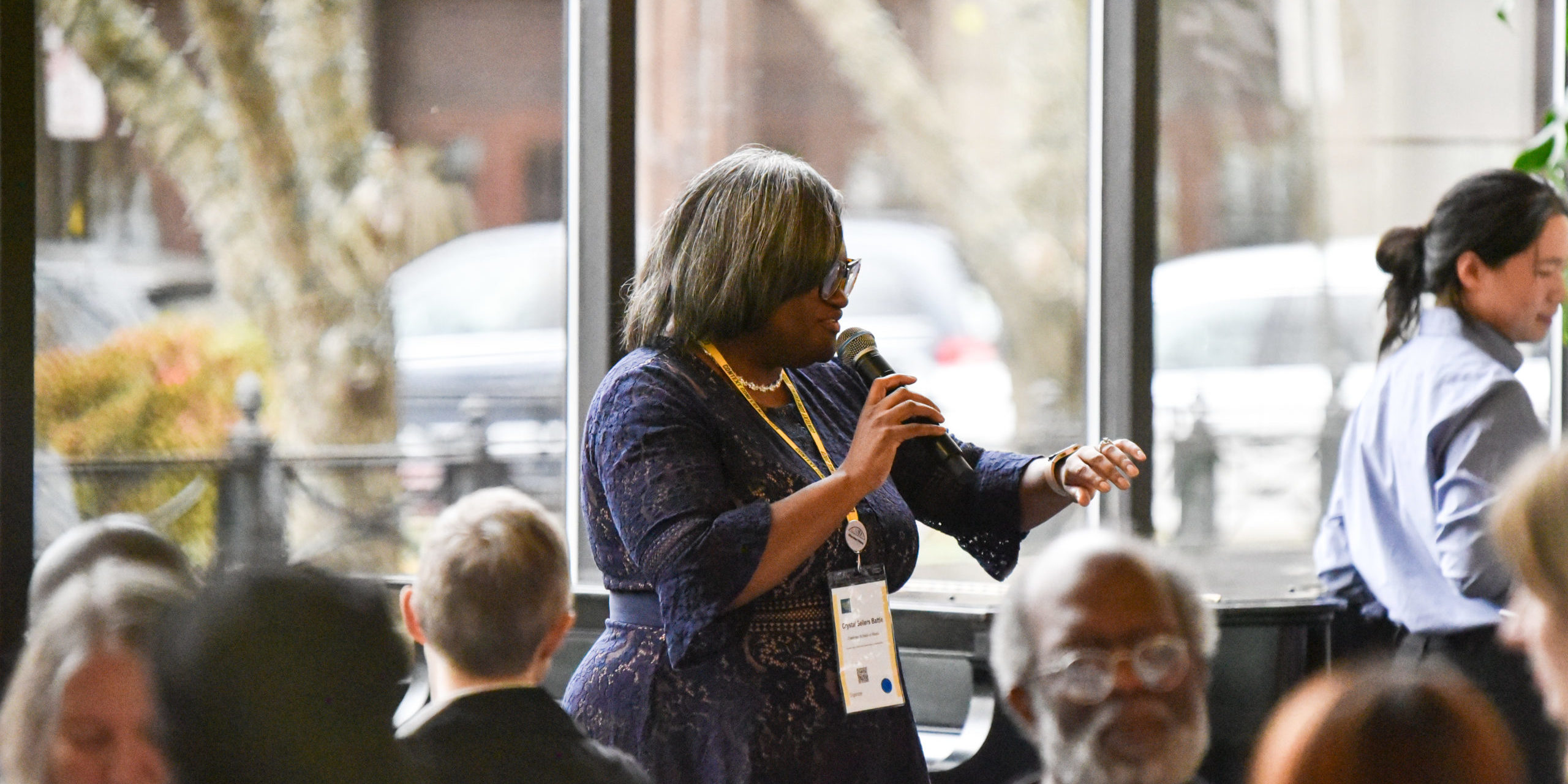*This article appeared in the spring 2024 issue of NOTES, Eastman’s alumni magazine, which can be read in full here.
A Time to Build: Eastman Hosts a Conference on Contextualizing Equity and Inclusion in Music
Eastman Associate Dean Crystal Sellers Battle didn’t plan to be a leader in diversity, equity, and inclusion (DEI) practices for musical institutions. After a childhood of singing in choirs and church, she was told she had the singing talent to pursue a performance degree in college. But when she arrived at college, she was pressured to choose between being a classical singer or a gospel singer.
“I did not know that choice was going to lead me into this career of thinking about what equity and inclusion in music looks like: being able to bring your entire self into the place and not have to leave portions of your identity outside the room,” Battle says.
It was the start of several experiences that catapulted her into a career of leading DEI initiatives in academic environments, eventually landing her at the Eastman School of Music as its first associate dean of equity and inclusion in 2022. As a first initiative at Eastman, Battle quickly started on planning the school’s inaugural Context Conference 2023: Contextualizing Equity and Inclusion in Music, which occurred on November 3 and 4 at Eastman, sponsored by Eastman’s George Walker Center for Equity and Inclusion in Music, Eastman’s Institute for Music Leadership, and the Office of University Engagement and Enrichment, with generous support from Helen Cha-Pyo ’93E (MM) and her family.
The conference aimed to be the first of its kind to gather people across all spheres of music to find solutions to the discussions many are having about DEI and social justice in music.
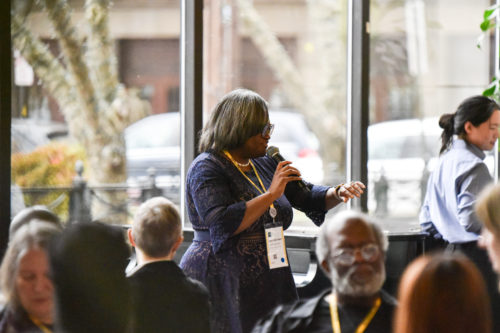
Dr. Crystal Sellers Battle, host and keynote speaker for Context Conference 2023, speaks to attendees at a luncheon in Sproull Atrium. Photo by Lauren Sageer.
“There are a lot of conversations happening,” says Battle, “but what do you actually do? I chose the word ‘context’ because I wanted us to take these ideas a step further and actually figure out what it’s going to mean ‘for my professional music organization, for my K-12 classroom, for my private studio, for my choral ensemble, for my wind ensemble, for my orchestra.’ What is this idea and concept going to mean for an individual’s specific areas?
“We often talk about the concepts around equity and inclusion in higher education, but for a variety of reasons—from scarcity of resources to lack of support from colleagues—we are often unable to practice these ideas at our institutions. It is my hope that this conference helps us move beyond these talks and drive us toward true and unique implementation for each of our organizations.”
The Context Conference was intended for everyone who values conversations around equity and inclusion in music with the goal of making real, holistic progress at their institution or arts organization, including: students who want to create space for repertoire by underrepresented composers; staff members wanting a more equitable and inclusive work environment; and faculty seeking tools to incorporate this work into their classrooms, studios, and mentorships.
The Context Conference featured 51 breakout sessions around five key conversation areas:
- Classroom Innovation
- Curriculum Shift
- Ensemble & Applied Area Repertoire and Performance Practice
- Community Engagement
- Recruitment and Retention
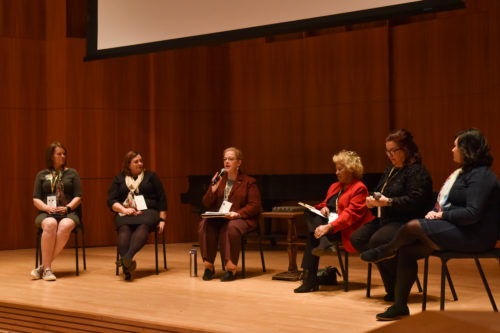
Context Conference 2023: Sigma Alpha Iota Philanthropies, Inc. sponsored panel “Women in Music Leadership: The Good, the Bad, and the Ugly.” Photo by Kerry Lubman.
Attendees included a full spectrum of speakers arriving from 28 states and Canada, ranging from national and international organizations to local educators and performers, totaling an impressive 546 attendees. Highlights include several representatives from Historically Black Colleges and Universities (HBCUs), as well as from organizations such as the Civic Orchestra of Chicago, El Sistema USA, Gateways Music Festival, and the Sphinx Organization. Several Eastman faculty and staff members, students, and alumni gave talks, in addition to K-12 music educators and performers from the Rochester region.
Jamal J. Rossi, Joan and Martin Messinger Dean of the Eastman School of Music, comments, “The past few years have been rich with initiatives to study, perform, and explore music outside of traditional boundaries. Eastman is excited to have brought together colleagues who are passionate about implementing meaningful and sustained change.”
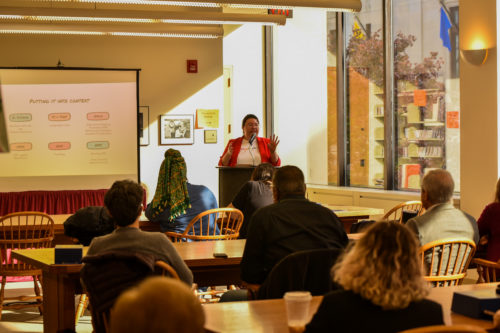
Eastman alum Tanya Chanphanitpornkit ’15E leads “Finding Your Voice in Music
Education” in Sibley Music Library for the 2023 Context Conference. Photo by Kerry Lubman.
For alumni attendee Tanya Chanphanitpornkit ’15E, the Context Conference was “a transformative experience, marked by a deep sense of community and shared commitment to Diversity, Equity, Inclusion, and Accessibility (DEIA) initiatives, bringing together hundreds of passionate individuals, using music as a powerful vehicle for social change. The conference atmosphere buzzed with energy and collaboration, filled with engaging discussions and insightful sessions. Speakers from diverse backgrounds shared their experiences in leveraging music to promote inclusivity and equality, offering eye-opening perspectives and inspiration.”
Chanphanitpornkit describes her presentation “Finding Your Voice in Music Education” as “a bastion of empowerment for the unique voice that every music educator possesses and how they can inspire positive change through community engagement.”
“Part of our Meliora values speak to equity and openness and this conference is an outward demonstration of those values in action. We are proud to support the Eastman School of Music and Dr. Battle for putting on this first-of-its-kind conference in Rochester,” says Adrienne Morgan, the University of Rochester’s Vice President for Equity and Inclusion and Richard Feldman Chief Diversity Officer. She adds, “Music is one of life’s joys and the more it is accessible, attainable and inclusive, the better.”
Along with Battle, the conference featured two more distinguished keynote speakers: Braxton Shelley, an associate professor of music, sacred music, and divinity in the Yale University Department of Music, the Institute of Sacred Music, and Yale’s Divinity School, and Lisa Beckley-Roberts, an associate professor of music and department chair at Jackson State University (an HBCU). Both speakers also gave individual presentations. Shelley’s talk, “A Time to Build,” concentrated on reconstruction within the academic sphere, “which has less to do with the move to abolish and overturn than with the sense of ‘how can I find a way to turn this institution’s resources toward the good?’” he says.
“This flows from the questions of, ‘are these institutions worth keeping, can they do good, is the history too loaded and heavy laden with all the things we can analyze?’”
The second keynote speaker, Beckley-Roberts, has close connections to Battle: the two started a consulting company called DIEMA (Diversity, Inclusion, and Equity in the Musical Arts) after coming together during the Covid pandemic in a support group for women music executives to share strategies at that time.
The title of Beckley-Roberts’ talk, “Thinking of a Master Plan,” is based on lyrics from rap artists Eric B & Rakim’s 1987 album Paid in Full, which is about making a plan despite economic shortcomings. “I love this idea about these two dynamic young men thinking of a master plan about how to manifest wealth for themselves in their community,” she says. “Because hip hop has shifted, it was much more about the community. And so that’s where that title came from. I was thinking of a master plan. How do we put into context this DEI work?”
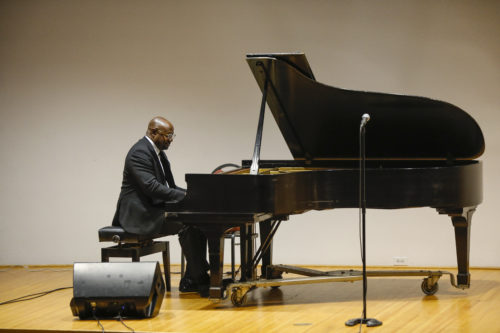
Noted pianist Anthony Walker headlining the Classics with a Twist concert at the Memorial Art Gallery. Photo by Matt Wittmeyer.
In addition to various talks and discussion at the conference, there were many musical performances woven throughout, culminating with a Saturday evening performance at the Memorial Art Gallery called “Classics with a Twist,” a kaleidoscopic and interactive concert led by the genre-bending pianist Tony Walker. Concertgoers experienced music in different parts of the gallery as a full, immersive experience.
Battle hopes that the conference spreads the message that “opening the traditionally closed, privileged art form of classical music will have a positive impact on the art form at large.”
She continues, “I like to think that classical music has been like a colonial home, made up of small rooms, a lot of small spaces very much compartmentalized. Each room had a specific function, and it stayed in that function,” she says. “What I’m hoping is that we can turn that old colonial home into more of an open concept, where we’re actually being influenced by each other, where the musical styles, teaching, pedagogy, performances, conversations, theory, musicology, can all start to influence each other.”
In her conference keynote address, Battle observed, “DEI does not stand for Divisive, Exclusionary, and Incendiary. It means that we are working to not only open the room but to allow everyone to feel free to own their space in the room.”
“The conference was more than just an event,” says Chanphanitpornkit. “It was a catalyst for personal and professional growth. The opportunity to network with professionals and activists was invaluable, sparking new ideas and potential partnerships, challenging my perspectives, and reinforcing my commitment to DEIA issues. I left feeling energized and motivated, with a renewed determination to contribute to creating a more inclusive and equitable world through the universal language of music.”
Battle has a concluding reflection: “I had a thought in my mind when envisioning what Context Conference 2023 could be. It was important to be able to bring together all sorts of music makers and we were able to accomplish that. The vision that I had in my mind was far surpassed by the energy, collaboration, and overall joie de vivre experienced at the conference. It is my hope that the synergy created in that moment will transcend until we come together again in November 2025.”

